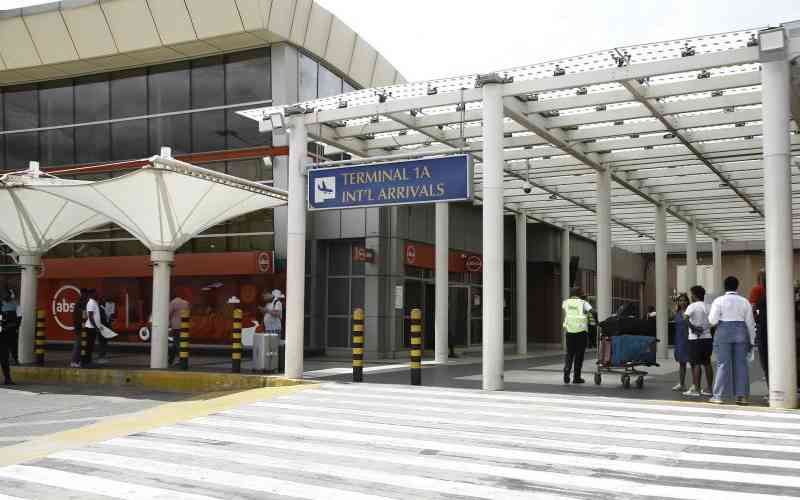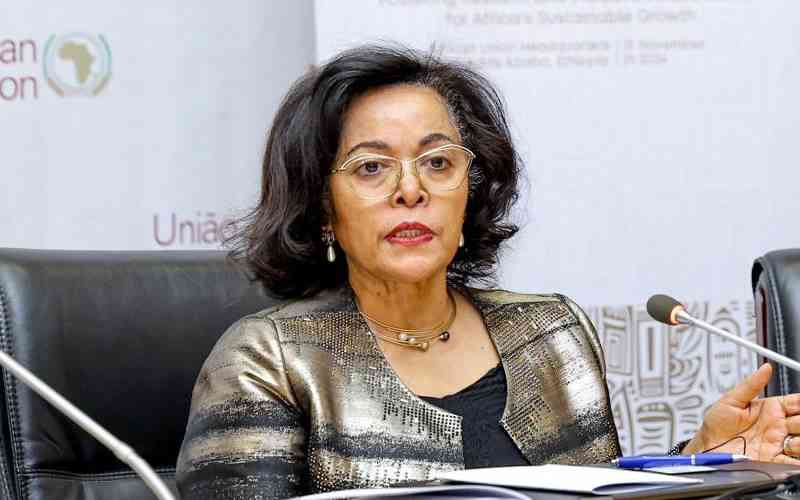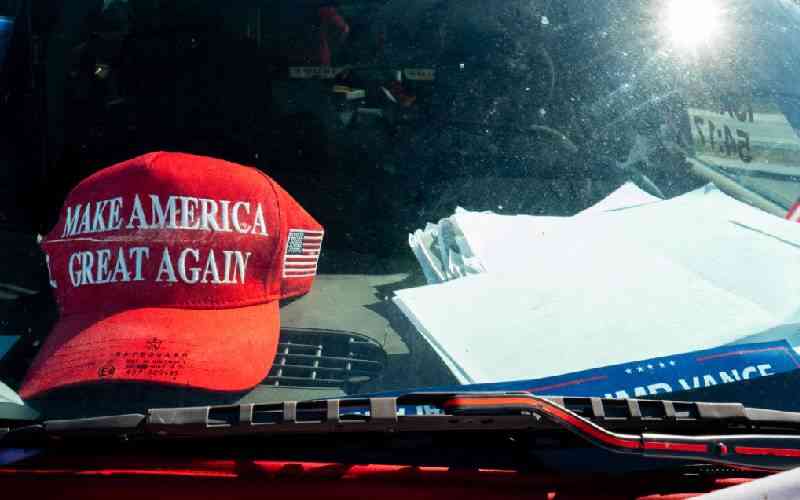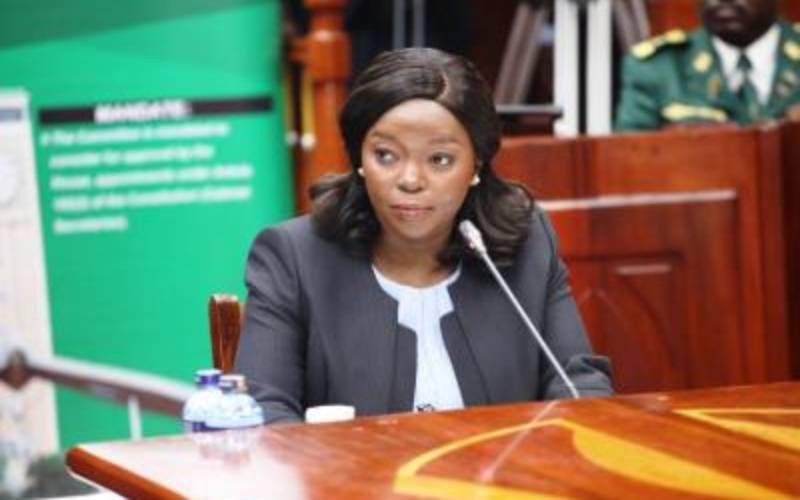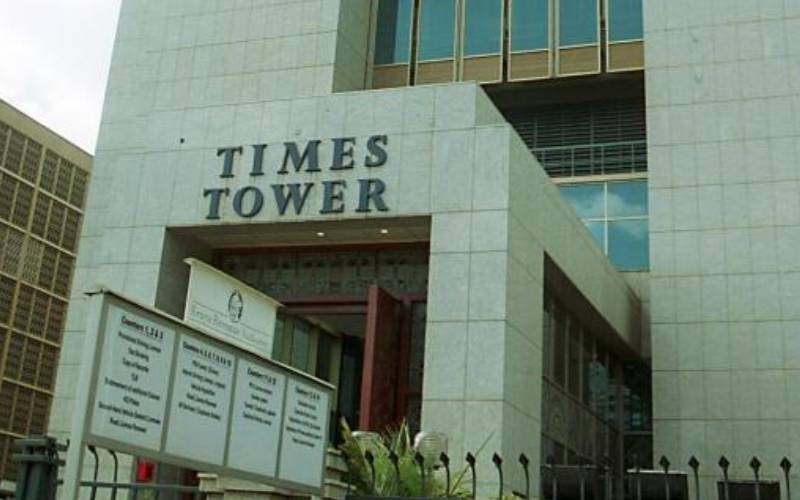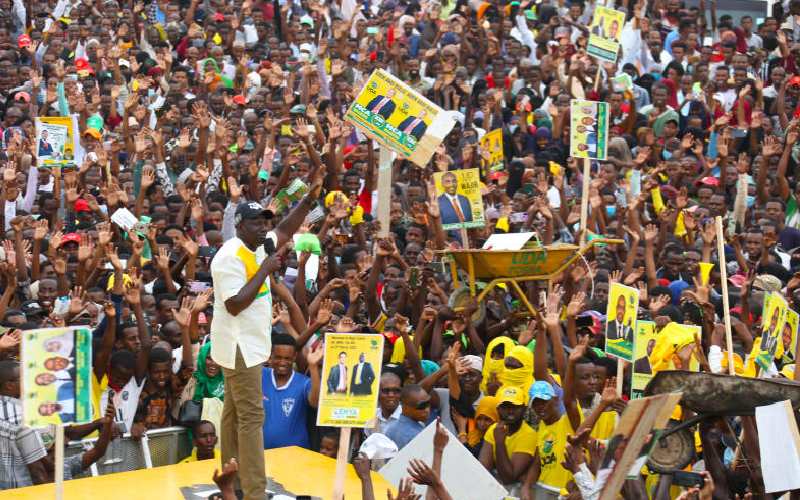
Kenya Kwanza brigade led by Deputy President William Ruto in Wajir Town for a public rally on April 1, 2022. [DPPS, Standard]
After the big fall, now comes the hard questions. Some leaders are demanding to know the amount of public resources that were used to finance the failed Building Bridges Initiative (BBI).
Critics of BBI, or the Constitutional Amendments Bill 2010, now want its promoters led by President Uhuru Kenyatta and former Prime Minister Raila Odinga investigated for wasting public money. Speaking to the press on Friday morning, Kenya Kwanza Alliance led by Deputy President William Ruto claimed that the constitutional amendment bill that was on Thursday declared illegal by the Supreme Court cost taxpayers Sh10 billion.
“While we laud the brave decision of a majority of men and women at the highest court of the land, it is not lost to Kenyans the colossal sum of money spent by the promoters of this unconstitutionality,” said Musalia Mudavadi, one of the principals of the Kenya Kwanza Alliance.
The Sh10 billion, Mudavadi said, was spent in hotels to collect public views on the project that was initiated by Uhuru and Raila. It is not the first time questions are being raised on the possible billions that have might have been ‘wasted’ on the exercise that was born out of the truce between President Kenyatta and Raila, or what came to be known as the Handshake.
However, the exact figure has not been easy to come by, says Bob Mkangi, a constitutional lawyer, who adds that the State has a hard time defending itself after failing to follow the right channels in as far as the prudent spending of the money was concerned.
“There is a case against the State. If, for example, the appropriation was done through the right channels, even if the bills fail, it is just unfortunate,” said Mkangi.
Dennis Waweru, one of the promoters of the Bill, had not responded to our questions by the time of going to press. The BBI secretariat held sittings in all the 47 counties before they came up with the report that culminated into the Constitutional Amendment Bill of 2019.
There was also the printing of the documents, travel by the taskforce members, the hosting of the delegates at Bomas and even the maintenance of a website. Moreover, as an incentive to pass the bill, each Member County Assembly (MCA) got a car grant of Sh2 million, which means that the State will pay Sh4.5 billion to the 2,224 ward representatives.
However, immediately after nearly all the county assemblies had passed the Bill, Kenya Revenue Authority surprised them by telling them it would slap the grant with a 30 per cent income tax. However, one of BBI task force Joint Secretaries, Dr Martin Kimani, in an interview with Citizen TV in 2019 said that the money that went into the development of the report was not more than Sh100 million.
“We did not have anywhere close to that amount of money (Sh10 billion) …I do not think we even had close to one per cent of that figure,” he said.
“That’s a figure that has just been thrown around the internet…it is not true. I am not the Administrator, but the figure was less than one per cent of that Sh10 billion supposedly.”
There is no evidence of the spending on BBI being approved by parliament, meaning that what was spend on the BBI had not been appropriated by the National Assembly, which begs the question where the money came from.
According to Mudavadi, who is now inviting Parliament and the office of the Auditor General to carry out a forensic audit, this only points to illegal diversion of public funds. Immediately after the Supreme Court judges pronounced themselves on bill, Deputy President William Ruto lashed at President Kenyatta and Raila.
“Now that the BBI is null and void, those responsible for it must be held to account for the resources that were put in that criminal exercise,” said Ruto.
In February last year, the National Assembly Majority Leader Amos Kimunya, while expressing confidence that BBI would sail through, said the referendum would be factored in the budget of the 2021/22 Financial Year.
Kimunya said the referendum would either be funded upfront or through a rationalised process. Opponents of the BBI, particularly Dr Ruto, have also insisted that the BBI was being implemented at the expense of development plans such as the Big Four Agenda in which Kenyatta’s administration intended to build cheap houses, offer decent manufacturing jobs, provide enough nutritious food and quality healthcare to all Kenyans.
However, Kimunya dismissed the claims. “Contrary to the noises you hear from public rallies that the Big Four Agenda has been abandoned, the truth is that even as we speak, the universal health coverage is being implemented,” Kimunya said.
The BBI, Mkangi said, had another cost in terms of the foregone expenditure in other deserving projects such as food security, especially at a time when a lot of Kenyans decried the high cost of living. Mudavadi said BBI would have cost taxpayers close to Sh5.65 billion to implement.
The Independent Electoral and Boundaries Commission (IEBC), however, told Parliament that the Government would have spent Sh14 billion should there have a referendum.
According to the framers of the BBI, the constitutional changes in the BBI were supposed to address endemic issues in the country such as ethnic antagonism and divisive politics which have been threat to the nation’s tenuous peace and stability.
In 2005, retired President Mwai Kibaki attempted to introduce changes to the Constitution in what was known as Wako Draft.
And while the draft was not challenged in court, Kenyans rejected it in a referendum, the country having spent millions in the development of the draft.
[Additional report by Patrick Beja]
 The Standard Group Plc is a multi-media organization with investments in media platforms spanning newspaper print
operations, television, radio broadcasting, digital and online services. The Standard Group is recognized as a
leading multi-media house in Kenya with a key influence in matters of national and international interest.
The Standard Group Plc is a multi-media organization with investments in media platforms spanning newspaper print
operations, television, radio broadcasting, digital and online services. The Standard Group is recognized as a
leading multi-media house in Kenya with a key influence in matters of national and international interest.

